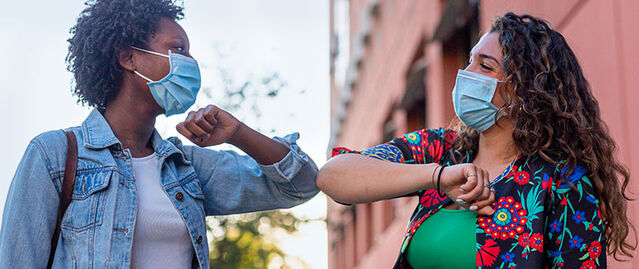Coronavirus Disease 2019
3 Ways to Leave 2020 in 2020
Tips on how to embrace the new year.
Posted January 12, 2021

“An optimist stays up until midnight to see the new year in.
A pessimist stays up to make sure the old year leaves.”
— William E. Vaughan, Columnist
This year, we’re doing both!
But if we're going to embrace the new year, we'll have to unpack our 2020 baggage.
Here are three ways to help us enter 2021 without the weight of our trauma:
1. Try to leave behind the idea that the 2020 pandemic was an unprecedented experience. Unfortunately, it was very precedented. Here are a few modern pandemics introduced to the United States before COVID-19:
- There was Cholera in the US in 1910
- SARS-CoV in 2002
- The Swine Flu in 2009
- MERS-CoV in 2012
- Ebola in 2014
- HIV/AIDS (which took 36 million lives)
In fact, our grandparents lived with the threat of polio, smallpox, measles, mumps, diphtheria, and rubella until vaccines all but eradicated them. The difference between the coronavirus pandemic and historical instances is that we expect our technology and medicine to be far above a virus. Unfortunately, pandemics are part of the human condition.
2. Try to leave behind the idea that sheltering and quarantining was totally devastating. It wasn’t what we are used to, but humans have always had to protect themselves from threats and disasters. At least this time, while we were staying out of this viral storm, we had the internet, streaming services, cable, virtual workouts, smartphones, FaceTime, and Zoom to keep us company. Previous generations did not. And don’t forget that quppies (quarantine puppies) and quittens (quarantine kittens) helped too.
3. Try to leave behind the idea that the COVID-19 experience will inevitably lead to PTSD. I want to start this point by clarifying that I am not discounting anyone’s mental health conditions that were heightened or newly developed from the stress of the extreme loss that has come from the COVID-19 pandemic. For anyone already struggling with anxiety, depression, or health concerns, COVID-19 certainly didn’t help. In fact, a Boston University School of Medicine study found depression symptoms to be three times higher during the pandemic than before the lockdowns and social distancing.
But frontline workers and first responders are showing great resiliency. The streaming and social media content prove that our humor and creativity are still intact, and we’ve each learned that our survival instincts are strong. In fact, after other national tragedies like September 11th, only about 15% of Americans still felt emotional side-effects after 18 months. If you do feel that the pandemic has affected your mental health, please reach out for professional help through your physician, clergy, or national organizations with an online presence.
Now, here are four things to bring with us into 2021:
1. Let’s bring our families. Maybe it’s the family we grew up with, the family we are trying to start, the family we’re already parenting, the coronavirus "pod" family, but it’s especially the "support" family. It’s the relatives and friends who got us through this year with texts, videos, memes, gifs, jokes, notes, calls, and events shared through technology and social distancing.
2. Let’s bring our social awareness. The increased awareness of the divisiveness of racial discrimination, religious intolerance, gender discrimination, discrimination against immigrants, and discrimination based on sexual orientation has been a harsh reminder during 2020. This year let’s continue to increase our ability to empathize with others from diverse backgrounds and cultures to promote equality. Activism raises endorphins and redirects general anxiety into valuable action.
3. Let’s bring our appreciation. This pandemic is a war with no enemies, only heroes. Physicians, nurses, first-responders, scientists, teletherapists, and teachers have taught us about human kindness and the power of gratitude. Let’s never take them for granted again.
4. Let’s bring pride in ourselves. Most of my patients were surprised by their emotional strength in 2020. In fact, I had fewer patients complaining about their partner, their relatives, or their friends than ever before. I guess when so many "big" things are going on, we remember not to sweat the small stuff. One couple said they are moving forward with family building with IVF instead of the cruise that was postponed. Another decided to get married now rather than wait to have a lavish wedding. Our pride and our perspective have both grown.
And now, here are the five things to bring into 2021:
1. To improve your mood and get a better night’s sleep, don’t doomscroll. Choose one or two news broadcasts per day and control your computer content. Every time you see that COVID-19 sphere icon, your adrenaline activates your fight or flight, but you have nowhere to go but bed. Instead, watch a comedy, do a puzzle, find a new recipe, or listen to music.
2. To increase your sense of control and choice, think of cancellations due to the pandemic as postponements that you will revisit later. That promotion party may mean very little by the time it will be safe to reschedule it, and even the honoree may have moved on.
3. To burn up your stress hormones, be active. Try to get in 30 minutes of movement a day. That doesn’t necessarily mean exercise classes or routines. It just means movement. Put on some music and dance around the room for a while if you are at a computer all day, or reorganize your kitchen cabinet if you’re feeling productive. My favorite thing to do is find a flash mob YouTube video and try to follow along. Need more inspiration? Check out my post, "How to Keep Your Body Moving When Your Mind Says Veg.”
4. To stop the flow of your stress hormones and pause. Take five minutes extra in the shower, look at the pictures on your phone, chant a mantra like “This too will pass,” or say a prayer if it brings you peace. Take five minutes to forget the “what ifs” and the “how longs.” Be in the here and now.
5. To increase your self-care, be your own best friend. Start a New Year’s list of things you like about yourself and add to it every day. Make sure you stop putting yourself down, it gives other people ideas!
Now that we’ve established the dos and don’ts of entering the year, it’s important for us to look back at everything we’ve been through and be thankful for all that we still have. Many of my patients and friends who are first responders, or have lost jobs or loved ones, tell me that gratitude is helping them leave 2020 behind. It refocuses them on what they still have to be thankful for and points them towards a better 2021. It seems to be a year filled with promises and we have to help them come true for ourselves.
Stay safe and Happy New Year!




